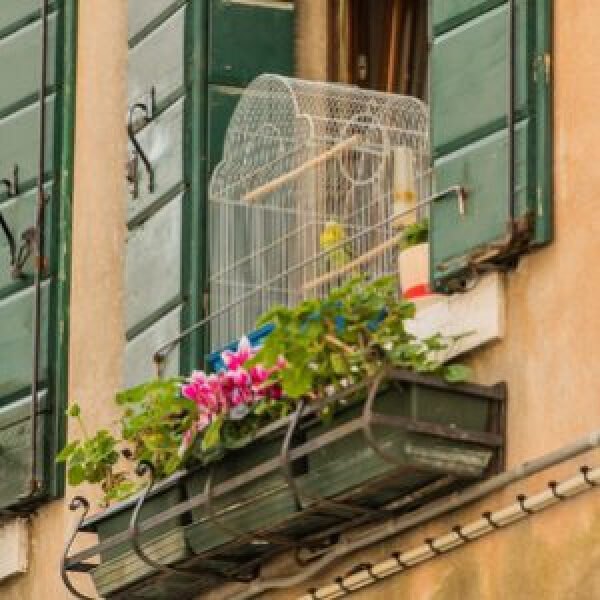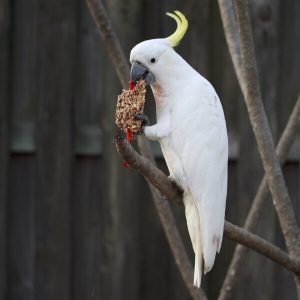Last Updated on by Mitch Rezman
Birds are known for being messy creatures, and this can be seen not only in their living spaces but also in their feeding areas.
There are a few reasons why pet birds are just as messy as wild birds, and these include their 100,000,000 years of instinctual expectation as foragers, their feeding habits, and their physical characteristics.
Birds are messy because they are foragers.
This means that they search for food by pecking at the ground or foliage, and this can cause a lot of debris to be scattered around.
They eat pregnant fish in one lake and poop out fertile fish eggs in another lake miles away.
When birds are foraging for seeds, they scatter them all over the place while moving.
For those of you with some form of ADD who can’t handle bird debris on your new Pergo floors or see it embedded in your 70’s style shag carpeting – pet birds are not a good fit for your lifestyle.
Older video but still relevant about cleaning birdcages
In the wild, birds like to turn over leaves and grass to find insects, and this can scatter plant material around their feeding area.
In our homes, they tear up proper bird toys (for the bird) toys are not available they will settle for drapes, blinds, and furniture.
What is a “proper bird toy”?
A bird toy your bird engages with.
A perch can be a bird toy also like this one
Birds are messy because of their feeding habits and physical characteristics.
Most pet birds like to eat a lot and quickly, which can lead to fast and furious feeding sessions that result in food being spilled or scattered everywhere.
This is a survival technique. When birds are bending down to feed they cannot watch the sky for predators so that’s why you’ll see them constantly looking up.
Further birds don’t have teeth nor a mammal-like Jaw which was a trade-off with nature for flight in terms of weight, The hulls come off seeds but smaller seeds are simply swallowed into the crop where they can remain intact for up to 6 hours.
Shameless self-promotion here, the seeds in
Tropimix bird food from Hagen, have been hulled for you ~ you’re welcome
Birds have a unique digestive system that produces both solid and liquid waste, which means they need to excrete frequently.
This can lead to bird droppings being scattered across their living and feeding areas, which can be unsightly and unhygienic.
Another survival technique ~ birds can regurgitate their entire crop contents almost immediately in order to reduce takeoff weight for defensive flight.
The food then travels onto two stomachs for digestion but that’s for another story.
Wild birds like to eat berries from trees, and they will often peck at them aggressively which can cause them to fall and create a mess on the ground.
If your bird likes pomegranate seeds, just cover the kitchen walls, or you’ll be wiping pomegranate juice off for eternity.
Moreover, birds will often take food items back to their nests or perches and eat there, which can result in droppings or debris accumulating in those areas.
I personally spend about 15 minutes every day or two and then 30 minutes at least once a week for some heavy “crevice” vacuuming.
Moreover, birds are covered in feathers that will molt at least annually, as a rule creating an additional mess.
When all our birds are molting I sleep with my gun and vacuum next to the bed.
Overall, birds are messy creatures due to their nature as foragers, their feeding habits, and their physical characteristics.
Despite their messiness, wild birds play important roles in ecosystems by helping to pollinate plants, control insect populations, and distribute plant seeds.
Feathered factoid ~ birds are immune to habanero peppers which enables them to transport the seeds, endlessly.
Therefore, while their messiness can be frustrating, it is important to remember the valuable contributions that birds make to the natural world.
I find peace watching all our birds flutter about (we keep cage doors open a good part of the day) and all their sweet tiny voices ~ as long as I’m not wearing my hearing aids.
Muting them doesn’t work because Chili immediately learned how to snag one out my ear without ever landing on my shoulder – watching a $3000 hearing aid fly away in a velociraptors beak was nerve-wracking.
About the featured image (top of the page):
The kakariki parakeet is a type of parakeet, also known as the orange-fronted parakeet.
It is native to New Zealand and is found primarily in the Canterbury region of the South Island.
The kakariki parakeet is one of the rarest parakeet species in the world, with only around 200-300 individuals left in the wild.
The main threats to their survival include habitat loss, predation by introduced mammals, and disease.
Conservation efforts are underway to protect the kakariki parakeet, including predator control, habitat restoration, and captive breeding programs.
Written by Mitch Rezman
Approved by Catherine Tobsing
.
Author Profile
Latest entries
 Feeding Exotic BirdsDecember 29, 2025How to Switch or Convert Your Bird From Seeds to Pellets: Real-Life Case Studies and Practical Guidance
Feeding Exotic BirdsDecember 29, 2025How to Switch or Convert Your Bird From Seeds to Pellets: Real-Life Case Studies and Practical Guidance Feeding Exotic BirdsDecember 16, 2025A Practical, Budget-Smart Guide to Feeding Birds Well
Feeding Exotic BirdsDecember 16, 2025A Practical, Budget-Smart Guide to Feeding Birds Well Bird EnviornmentsDecember 7, 2025Understanding Budgie Cage Bar Orientation: Myths, Realities & Practical Solutions for Vertical-Bar Bird Cages
Bird EnviornmentsDecember 7, 2025Understanding Budgie Cage Bar Orientation: Myths, Realities & Practical Solutions for Vertical-Bar Bird Cages Feeding Exotic BirdsDecember 5, 2025How Dr. T.J. Lafeber Rewrote the Future of Pet Bird Nutrition
Feeding Exotic BirdsDecember 5, 2025How Dr. T.J. Lafeber Rewrote the Future of Pet Bird Nutrition





Julie Rice
23 Apr 2023I have long thought that parrots are messy eaters because it must be their job in the ecosystem to feed the ants, LOL. My Red Lored Amazon loves to crunch up larger bits of food into small bits. So much drops on the bottom of the cage, that I often wonder what percentage even goes down her throat. I don’t actually know if this is typical, or a domestic bird habit. Possibly, wild birds are less wasteful. But if the wild birds do it – food for ants.